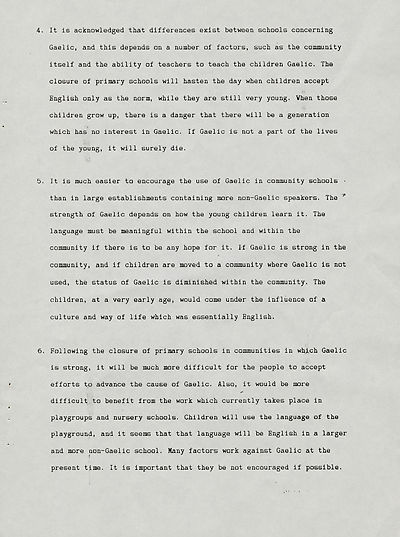An Comunn Gàidhealach Publications > School, Gaelic and the community : paper to local authority councillors = An sgoil, a' Ghaidhlig 's a' choimhearsnachd : paipear gu Comhairlichean nan Ughdarras Ionadail
(9)
Download files
Complete book:
Individual page:
Thumbnail gallery: Grid view | List view

4. It is acknowledged that differences exist between schools concerning
Gaelic, and this depends on a number of factors, such as the community
itself and the ability of teachers to teach the children Gaelic. The
closure of primary schools will hasten the day when children accept
English only as the norm, while they are still very young. When those
children grow up, there is a danger that there will be a generation
which has no interest in Gaelic. If Gaelic is not a part of the lives
of the young, it will surely die.
5. It is much easier to encourage the use of Gaelic in community schools •
than in large establishments containing more non-Gaelic speakers. The *
strength of Gaelic depends on how the young children learn it. The
language must be meaningful within the school and within the
community if there is to be any hope for it. If Gaelic is strong in the
community, and if children are moved to a community where Gaelic is not
used, the status of Gaelic is diminished within the community. The
children, at a very early age, would come under the influence of a
culture and way of life which was essentially English,
6. Following the closure of primary schools in communities in which Gaelic
is strong, it will be much more difficult for the people to accept
efforts to advance the cause of Gaelic, Also, it would be more
difficult to benefit from the work which currently takes place in
playgroups and nursery schools. Children will use the language of the
playground, and it seems that that language will be English in a larger
and more non-Gaelic school. Many factors work against Gaelic at the
present time. It is important that they be not encouraged if possible.
Gaelic, and this depends on a number of factors, such as the community
itself and the ability of teachers to teach the children Gaelic. The
closure of primary schools will hasten the day when children accept
English only as the norm, while they are still very young. When those
children grow up, there is a danger that there will be a generation
which has no interest in Gaelic. If Gaelic is not a part of the lives
of the young, it will surely die.
5. It is much easier to encourage the use of Gaelic in community schools •
than in large establishments containing more non-Gaelic speakers. The *
strength of Gaelic depends on how the young children learn it. The
language must be meaningful within the school and within the
community if there is to be any hope for it. If Gaelic is strong in the
community, and if children are moved to a community where Gaelic is not
used, the status of Gaelic is diminished within the community. The
children, at a very early age, would come under the influence of a
culture and way of life which was essentially English,
6. Following the closure of primary schools in communities in which Gaelic
is strong, it will be much more difficult for the people to accept
efforts to advance the cause of Gaelic, Also, it would be more
difficult to benefit from the work which currently takes place in
playgroups and nursery schools. Children will use the language of the
playground, and it seems that that language will be English in a larger
and more non-Gaelic school. Many factors work against Gaelic at the
present time. It is important that they be not encouraged if possible.
Set display mode to:
![]() Universal Viewer |
Universal Viewer | ![]() Mirador |
Large image | Transcription
Mirador |
Large image | Transcription
| Permanent URL | https://digital.nls.uk/126159699 |
|---|
| Description | This contains items published by An Comunn, which are not specifically Mòd-related. It includes journals, annual reports and corporate documents, policy statements, educational resources and published plays and literature. It is arranged alphabetically by title. |
|---|
| Description | A collection of over 400 items published by An Comunn Gàidhealach, the organisation which promotes Gaelic language and culture and organises the Royal National Mòd. Dating from 1891 up to the present day, the collection includes journals and newspapers, annual reports, educational materials, national Mòd programmes, published Mòd literature and music. |
|---|---|
| Additional NLS resources: |
|

